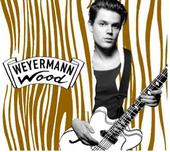Weyermann Wood (English)
After “Pool†follows “Woodâ€, after loud quiet, after the day the
night: Eleven short months following the third solo album, Adrian Weyermann serves up his fourth, “my classic songs record†so he says himself. As it is, the tracks on â€Pool†and “Wood†have the same roots. Except for “Wood†and “Don’t look backâ€, they were all recorded during the same studio sessions with the same personnel.
With “Pool†Weyermann and his co-musicians, valiantly put the pedal down, the songs on “Wood†rock along in the rhythm of a train trip. The songs don’t sound tuned-up, there’s space for mental rollercoastering, for dreaming. That was Weyermann’s intention: to write
and arrange songs, so that they retain their magic and their secrets. An odd familiarity wafts about these songs. Here’s someone carrying the torch further, of which the flame was ignited sometime in the sixties. All the while he attempts to confront the tradition “pure†and without cynicism. On the search for the authentic in the great pool of tone and word someone’s dauntlessly thrown on the jukebox of memories. With a view to the past, but with the thoughts always facing straight ahead. As Weyermann sings on “Million Daysâ€
where the melodies dwell, life knows no end.
Thumbing his nose at cleverness, resisting the temptation to overdress the song sketches, having the courage to sound pretty: Weyermann’s not trying to prove originality, but penetrate the heart with his songs. Finally it’s about nothing less than the “cornerstones†in life as it goes in “Leavingâ€, the good as well as the bad. When desire dances with melancholy, then Weyermann gets cosy warm. Hot meets cold:â€Burning Cold†accordingly a central song.The contention between the poles manifests itself in the music as well. Sometimes the songs are rigidly conceived, sometimes committed to open form, with space for improvisation. In such songs (“Parkerâ€, “Lovelightâ€, “Woodâ€), Weyermann’s possible musical future peers shyly around the corner. “Wood†shall be his last record with straight verse/chorus structure. In this sense the album marks arrival as well as departure. If one has never heard Weyermann so reduced, personal and free, then this is the path he has chosen to follow with conviction - as a musical Pinocchio, curiously fumbling into every
difficulty imaginable and with eyes wide open, balancing on the thin line of opposites.
“If there was one thing left to do, I’d give my pounding heart to youâ€,
goes the line in the last piece “Ida Squareâ€. That goes for the whole record- it’s Weyermann’s gift to all who’d rather keep the flame alive than to worship the ashes.
